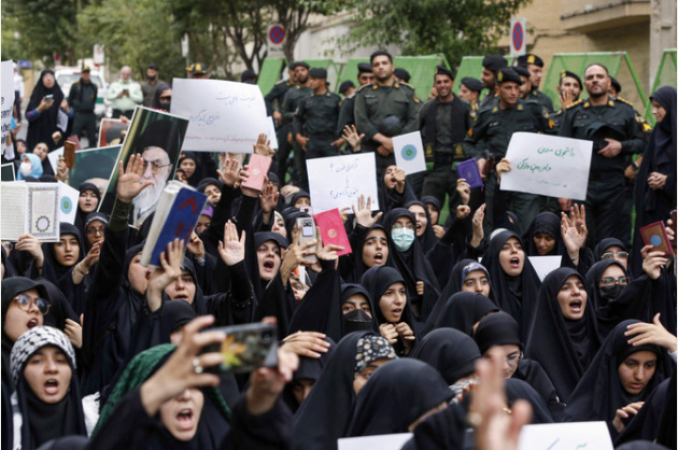
Baghdad: In response to a dispute over Stockholm's approval of protests during which the Qur'an was profaned, Iran declared late Friday that it would not permit a new Swedish ambassador to enter the country.
Foreign Minister Hossein Amir-Abdollahian said on state television that the Swedish ambassador's term in Tehran had come to an end and that the country would not accept the new ambassador "until the Swedish government takes a serious action over the desecration of the Holy Qur'an."
He continued, "The Iranian ambassador will not be dispatched to Sweden. After an evening protest in Tehran's capital city that saw hundreds of protesters congregate outside the Swedish embassy, he made his announcement.
Also Read: Zelensky dismisses Ukraine's ambassador to the UK following complaints
The demonstration turned into a sit-in, during which the crowd threw eggs and tomatoes at the building and declared they would remain there until the Swedish ambassador was expelled from Iran.
After Friday prayers, protesters gathered and carried copies of the Qur'an and Iranian flags. Some demonstrators in Tehran burned the Swedish flag as they chanted, "Down with the United States, Britain, Israel, and Sweden."
Other significant Iranian cities, such as Tabriz in the northwest, Mashhad in the northeast, and Isfahan in the country's center, also hosted similar protests.
The protests took place in the midst of heightened hostilities between Stockholm and Muslim nations over an Iraqi refugee living in Sweden who burned Qur'anic verses in front of Stockholm's main mosque last month.
Salwan Momika, a refugee, stepped on the Qur'an in the most recent incident, which happened on Thursday, but he did not burn it. His deed sparked fresh condemnation throughout the Muslim world.
On Thursday, Iran summoned the Swedish ambassador to express its displeasure with Stockholm for permitting Momika's actions on the grounds of free speech.
On Friday, Amir-Abdollahian telephoned Tobias Billstrom, his Swedish counterpart.
He was quoted as saying in a statement from the foreign ministry that "the person who committed this unforgivable insult must be arrested, tried, and held accountable for his actions."
"What happened to the Embassy of the Kingdom of Sweden in Baghdad cannot be repeated, and any similar act will be subject to legal accountability," the statement continued.
After the attack on its embassy compound, Sweden decided to relocate the staff on Friday, citing security concerns.
Also Read: UK councils request more time from the government to house Afghan refugees
The Swedish foreign ministry stated that the temporary relocation of the embassy's operations and its expatriate staff to Stockholm was necessary for security reasons.
Iraq denounced the embassy attack, but in response to the Stockholm demonstration, it expelled its ambassador, threatened to break off ties, and announced that it was suspending the license of Swedish telecom giant Ericsson.
However, a spokesperson for the prime minister claimed on Friday that contractual obligations would be honored and that "no company has been suspended, not even Ericsson."
Sabbah Al-Tai, a 45-year-old protester in Sadr City, Baghdad, claimed that removing Sweden's ambassador was insufficient.
We need more, he remarked.
Crowds gathered there on the directive of powerful Shiite cleric Moqtada Sadr, whose adherents were responsible for the raid on the embassy late on Wednesday.
Rainbow flags were burned by some protesters, highlighting what Sadr calls the "double standard" of Western governments in defending LGBTQ rights while tolerating the desecration of sacred texts.
Amer Shemal, a municipal official, said, "Through this demonstration, we want to send a message to the United Nations," pleading with members of the organization to "penalize any desecration of holy books—those of Islam, of Christianity, of Judaism."
Saudi Arabia, which is home to the holiest sites in Islam, had earlier stated that it would urge Sweden "to take all immediate and necessary measures to stop these disgraceful acts," according to a statement from the foreign ministry.
Jordan, the United Arab Emirates, Oman, Kuwait, and other Arab and Muslim nations have summoned Sweden's charges d'affaires in response to their widespread condemnation of Sweden's decision to permit the protest.
The Qur'an protest was also denounced by the British foreign office, which described it as "deeply insulting to Muslims around the world and completely inappropriate."
According to the state news agency, Kuwait said it was working with Arab nations to organize an urgent gathering of the 57-member Organization of Islamic Cooperation in Jeddah to take "concrete and practical" actions to ensure that such an insult to the Qur'an would not be repeated.
Momika, who calls himself an atheist, defended his actions in an interview that was published on Friday, saying they were intended to draw attention to prejudice against minority groups in Iraq.
According to him, "My book-burning was done in compliance with Swedish law," he told the French publication Marianne. I will continue to burn the Qur'an as long as it is legal to do so.
Also Read: USS Canberra: First Navy warship to be ordered by the US in a foreign port
Billstrom emphasized a "constitutional right to freedom of assembly, freedom of expression, and freedom to demonstrate" while describing Momika's demonstration as "a clear provocation" that "in no way reflects the Swedish government's opinions."
Hezbollah supporters held a rally in Lebanon on Friday, according to AFP photographers. In their chants, many protesters vowed to "protect God's book" with their "blood."